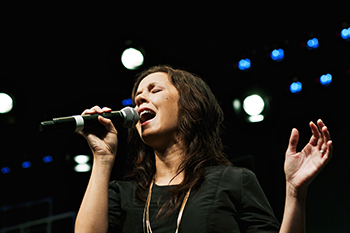The 2025 Jubilee theme, “Pilgrims of Hope”, is such a relevant theme for our times. In the face of overwhelming human suffering, devastating warfare, unprecedented human displacement and migration, climate crisis and global political and economic volatility, hope is scarce.
In Laudato Si’, Pope Francis calls us to heed and respond to the “cry of the earth”. Without a sure and solid hope, this is a daunting, almost hopeless challenge. In his wisdom, Pope Francis offers this very timely Jubilee theme as an invitation to rediscover hope in the context of the stark, harsh realities of our world.
In his letter of announcement of the Jubilee theme, Pope Francis says:
“We must fan the flame of hope that has been given us and help everyone to gain new strength and certainty by looking to the future with an open spirit, a trusting heart and far-sighted vision. The forthcoming Jubilee can contribute greatly to restoring a climate of hope and trust as a prelude to the renewal and rebirth that we so urgently desire…”[i]
Fanning the flame of hope, he says, will require, “an intense year of prayer in which hearts are opened to receive the outpouring of God’s grace”. Pope Francis refers to this intense year of prayer as a “symphony” of prayer.
 Here we see the significant role that music plays in our spiritual journey. The ancient proverb that “one who sings prays twice”[ii], is underscored by the many references in Scripture to singing. St Paul urged the early Christian community to be united as one body by “singing psalms, hymns and inspired songs with gratitude in their hearts to God” (Col 3:16). From a liturgical perspective we know music has a pre-eminent place in our worship and celebrations.
Here we see the significant role that music plays in our spiritual journey. The ancient proverb that “one who sings prays twice”[ii], is underscored by the many references in Scripture to singing. St Paul urged the early Christian community to be united as one body by “singing psalms, hymns and inspired songs with gratitude in their hearts to God” (Col 3:16). From a liturgical perspective we know music has a pre-eminent place in our worship and celebrations.
Beyond our worship and prayer, however, music is a universal language that is intrinsic to our human utterance and expression of life. Since music is the language of the soul and the primal vibration of our humanity, it is the one language that can unite even the most culturally diverse people at the core of their being. Music serenades our lives and literally strikes a chord with an ancient part of our brain, the limbic system, provoking various emotional responses that are fundamental to being human. Music has the innate capacity to enable the human soul to express the inexpressible, the sacred, the mystical, the divine. “After silence, that which comes nearest to expressing the inexpressible is music.”[iii]
The ancient Celts believed music to be the fifth element of matter, giving it the same prominence as earth, water, air and fire in their daily living and rituals. Their spiritual leaders would listen to the harp during prayer and meditation, in search of wisdom and guidance.
Closer to home, Aboriginal and Torres Strait Islander people honour an ancient appreciation of the significance of music and song. Their “songlines” are sung celebrations of Country and tell the stories of Dreamtime. They describe the features of the land and give direction to the traveller’s destination. The songlines also give important information about how to respectfully travel the land while being mindful of the ancestral stories of the land they traverse. In singing their songlines while making their journey, Aboriginal people nourish their souls and ground themselves in the sacredness of their journey.[iv]
 We too are on a spiritual journey. As pilgrims, we too need our songs to guide us, inspire us and draw us in the sacred footsteps of the Holy One who leads us home. The beautiful Jubilee theme song, “Pilgrims of Hope” does this for us. It sings of our reality as “scattered fragile sons and daughters” seeking our home in God; placing our trust in the “source of life that has no end”, the tender, patient One who is the “dawn of hope”.
We too are on a spiritual journey. As pilgrims, we too need our songs to guide us, inspire us and draw us in the sacred footsteps of the Holy One who leads us home. The beautiful Jubilee theme song, “Pilgrims of Hope” does this for us. It sings of our reality as “scattered fragile sons and daughters” seeking our home in God; placing our trust in the “source of life that has no end”, the tender, patient One who is the “dawn of hope”.
In listening to and singing its gentle, flowing melody, adorned with glorious harmonies, our hearts soar like eagles (Is 40:31). As the chorus sings, “like a flame our hope is burning”, we are fired to spread the flame of hope beyond our own personal sphere to “ev’ry nation, tongue, and people”. For as Pope Francis assures us, Jubilee 2025 will truly be “the renewal and rebirth that we so urgently desire”, if and only if, “we recover a sense of universal fraternity”.[v]
So, let us sing and pray our songs of hope as we prepare for Jubilee 2025. But as we sing and pray, let us reach out, each in our own way, beyond the barriers of faith and culture, and all that separates us, to unite in song as fellow pilgrims of hope on this earth.
 Monica Brown is director of Emmaus Productions. She began her ministry as a teacher and went on to do additional studies in spirituality, pastoral guidance, liturgy and creative arts. Her music is sung all over the world by people of all ages in schools and parishes, in family homes and religious communities, in hospitals and prisons and in places of gathering and celebration. For more information visit www.emmausproductions.org
Monica Brown is director of Emmaus Productions. She began her ministry as a teacher and went on to do additional studies in spirituality, pastoral guidance, liturgy and creative arts. Her music is sung all over the world by people of all ages in schools and parishes, in family homes and religious communities, in hospitals and prisons and in places of gathering and celebration. For more information visit www.emmausproductions.org
Images: Unsplash
Words: © Monica Brown – May 2024
[i] Letter of the Holy Father Francis for the Promotion of the New Evangelisation for the Jubilee 2025: 1 January 2022.
[ii] Attributed to St Augustine.
[iii] Aldous Huxley, The Rest is Noise.
[iv] Deadly Story – Songlines https://deadlystory.com/page/culture/Life_Lore/Songlines
[v] Letter of the Holy Father Francis for the Promotion of the New Evangelisation for the Jubilee 2025: 1 January 2022.



